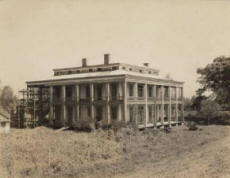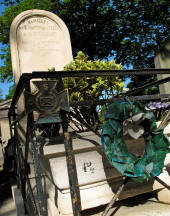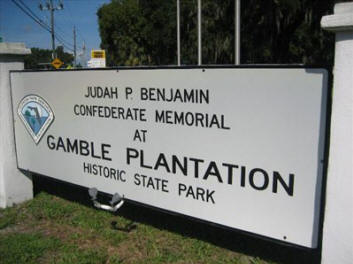|
Judah P. Benjamin
(1811-1884)
A worthy Namesake
Scholar - Statesman -
Queen's Counsel
From humble beginnings, Judah P.
Benjamin would become the first American Jew
to hold a number of significant public
positions, and would successfully carved\ out
three separate distinguished public
careers under the flags of three
different nations. His
intellect, affable personality, work
ethic, business acumen, and his oratory
and communication skills lead to his
meteoric rise and contributed greatly to
American history. Though ridiculed
by Northern anti-Semites, the South
welcomed Benjamin into her bosom,
allowing him to rise to heights no other
Jewish-American would rise to for
decades in America.
Early
Years:
Judah Philip Benjamin was born in
the British Virgin
Islands to Sephardic English immigrant
parents (Philip and Rebecca de Mendes
Benjamin) who were of Dutch and
Portuguese extraction. He was
brought to North Carolina at around age
two. At first the family lived in
Wilmington where Philip was in business
with uncle Jabob Levy. In 1817,
the Benjamins followed Mr. Levy up the
Cape Fear River to Fayetteville, NC.
There young Judah received his first
formal education at a private academy
run by Scottish Presbyterian minister
Colin McIver. In 1819, an economic
downturn left Mr. Levy broke and the
Benjamins relocated to Charleston, South
Carolina. Benjamin, a good
student, was admitted to a private
academy in Charleston run by Rufus Southworth,
financed by the Hebrew Orphan Society.
A
brilliant child, at age 14 he studied
law at Yale. But without completing his
studies he moved to New Orleans.
Making His
Mark:
In
New Orleans, Benjamin clerked for a
notary. This a position enabled
him to learn routine legal procedures
and read law in his spare time. He
also supplemented his income by teaching
English to French-speaking Creoles, an
activity that brought him into contact
with the wealthy St. Martin family.
He was admitted to the Bar in December
1832,
then
established his own practice of law.
On
February 12, 1833, at age 22, he married
16 year old Natalie St. Martin in a
Catholic Ceremony. At age 23
Judah wrote a reference book on law that
that became a standard text for lawyers
and judges in the State. As his
practice prospered, his new life of money
and fine things seemed to make his new
bride Natalie
only momentarily happy.
In
1840 Judah bought a plantation
near New Orleans called "Belle
Chase". He wanted the
most beautiful, extravagant,
house in all of Louisiana. He
plunged into the work of the
plantation. He wanted to show
the South that sugar cane could
be its future. Sugar
production was in its infancy in
Louisiana. Judah brought new
varieties of seeds from France
and new advanced growing
techniques. Planters came from
all over the state to dinner
parties with experts from all
over the country. Natalie was
miserable in his prosperous new paradise, but
they finally had a child after
ten years of marriage.
In 1844 Natalie took their child
and moved to Paris.
Benjamin then invited his
recently widowed sister, her
daughter, and his mother to live
with him. Judah did not
let Natalie’s departure, the
ensuing pain, and embarrassment,
deter him from carrying out the
plans he had for Belle Chasse.
He tore down the old house and
built a mansion surrounded by
double balconies supported by
twenty-eight square cypress
columns. It had twenty rooms
with 16 foot wide hallways,
crystal chandeliers, a marble
fireplace, a spiral mahogany
staircase and a veranda around
the entire house. Since Belle
Chase was not a plantation
handed down to him by an earlier
generation, he came to slave-owning later in life.
Judah purchased 140 slaves.
Judah took care to have a
plantation noted for its
humaneness and sought to be
known across Louisiana as a
gentleman that treated his
slaves well. |
 |
In 1852,
the flooding Mississippi reached the
very steps of Belle Chase. The crop of
sugar was destroyed and Judah did not
have the time to supervise its
replanting. He decided to sell Belle
Chase for a sum large enough for him to
retire the debt, buy a fine house in
Washington, and move his family to the
elegant home. His years as a planter
were ended.
Public
Life:
Louisiana Legislature
- Benjamin was elected to the
Louisiana legislature in 1842.
1st
Jewish American in the U.S. Senate -
In 1852, he was elected to the U.S.
Senate from Louisiana. This would
make the Honorable Judah P. Benjamin of
Louisiana the first acknowledged Jew
elected to the US Senate (1852).
Florida’s first Senator, David (Levy)
Yulee (elected in 1842, claimed he was
not Jewish at all, but descended from a
Moroccan prince. Thus because Benjamin
acknowledged his Judaism, it can be said
he took his seat in the halls of history
as the first acknowledged Jew in
America’s most influential legislative
institution.)
U.S.
Supreme Court Nomination- Senator
Benjamin was so eloquent and so well
thought of by two Presidents that
he was offered nomination to the U.S.
Supreme Court
(Millard Filmore - 1852 and Franklin
Pierce - 1854). Benjamin
declined on as he could not serve and
maintain his law practice.
Had he accepted, he would have been the
first Jewish American appointed to the
U.S. Supreme Court. Consequently,
62 years later the first would become
Louis Brandeis
in 1916,nominated by
President Woodrow
Wilson.
Famous New Year's Eve
Speech on Senate Floor - Often
regarded as his "farewell speech" to the
Senate,
historians consider Benjamin’s farewell
address to the U.S. Senate on New Year’s
Eve, 1860, one of the great speeches in
American history. The Senate gallery was
packed to hear the most eloquent voice
of the south. It was a moment both of
tragedy and triumph as he pleaded with
his colleagues against the war of
brothers to come:
“And now Senators…indulge in no vain
delusion that duty or conscience,
interest or honor, imposes upon you the
necessity of invading our States or
shedding the blood of our people. You
have not possible justification for it.”
Varina Davis, soon to become the
Confederate First Lady, wrote that
“his voice rose over the vast audience
distinct and clear…he held his audience
spellbound for over an hour and so still
were they that a whisper could be
heard…”
“[Benjamin continued] What may be the
fate of this horrible contest, no man
can tell…but this much, I will say: the
fortunes of war may be adverse to our
arms, you may desolate into our peaceful
land, and with torch and fire you may
set our cities in flame…you may, under
the protection of your advancing armies,
give shelter to the furious fanatics who
desire, and profess to desire, nothing
more than to add all the horrors of a
servile insurrection to the calamities
of civil war…but you can never subjugate
us, you never can convert the free sons
of the soil into vassals, paying tribute
to your power; and you never, never can
degrade them to the level of an inferior
and servile race. Never! Never!”
There was an immediate rush of reaction
to the speech from the Southern
contingent and tumultuous applause from
the galleries. Mrs. Davis reported
that
“many ladies were in tears. The Vice
President tried in vain to prevent the
applause but could not control the
multitude who were wild with enthusiasm.
There were even grudging compliments
from the Northern press and a quote from
a London correspondent that “it was
better than our Benjamin [Disraeli]
could have done.”
The enthusiasm in the South was matched
by the venom with tones of anti-Semitism
in the North. The Boston
Transcript of January 5, 1861, published
an editorial under the heading “The
Children of Israel” in which it attacked
the support Benjamin and other Southern
Jews gave to secession as indicative of
the disloyalty of all American Jews.
Senator Henry Wilson of Massachusetts,
who would be elected Vice President of
the United States in 1872, condemned
Benjamin because
“his bearing, his tone of voice, his
words, all gave evidence…that his heart
was in this foul and wicked plot to
dismember the Union, to overthrow the
government of his adopted country which
gives equality of rights even to that
race that stoned prophets and crucified
the Redeemer of the world.”
Confederate
Cabinet
- Louisiana would secede from the Union
in February 1861, and accordingly,
Benjamin did resign from the U.S.
Senate.
President Jefferson Davis appointed
Benjamin as his Attorney General on
February 21, 1861. The President chose
him because, in Davis's own words,
he "had a very high reputation as a
lawyer, and my acquaintance with him in
the Senate had impressed me with the
lucidity of his intellect, his
systematic habits, and capacity for
labor." Benjamin plunged into the
cabinet policy debates on all aspects of
the Confederacy and developed a
reputation as one who loved details,
complexity, and problem solving.
He would become known as the "Brains of
the Confederacy".
Confederate President Davis' appointment
would catapult Benjamin to the lofty
status of becoming the 1st
Jewish American cabinet member.
(Not until 1906, would a USA President
make a similar appointment - Oscar Straus was
appointed Sec. of Commerce and Labor by
President Taft).
Later, Benjamin was appointed Secretary of
War. He didn’t have a military
background, but in this role, he was the
mouthpiece for Jefferson Davis, himself,
deflecting criticism that could have
been leveled on Davis, his affable style
able to "smooth over" feathers Davis
ruffled. In her autobiography,
Jefferson Davis’s wife, Varina, informs
us that Benjamin spent twelve hours each
day at her husband’s side, tirelessly
shaping every important Confederate
strategy and tactic. Yet, Benjamin never
spoke publicly or wrote about his role
and burned his personal papers before
his death. He acted as an intermediary
and mouthpiece, but always following
Davis’ orders. His last post was as
Secretary of State, and it was under him
that the Seal of the Confederacy was
commissioned, as a way to gain prestige
in England. He worked to enlist aid
from England and France, in diplomatic
recognition of the Confederate State of
America.
Escape from Capture - Fearing
capture and imprisonment (President
Davis and Vice President Stephens were
both captured and imprisoned), with a
immense $40,000.00 (a half million in
today's dollars) bounty imposed by the
U.S. Government, Benjamin embarked on a
harrowing escape. He had planned
for the eventuality, and developed a
disguise - a Frenchman seeking
land on which to settle. He was
able to speak broken English like a
Frenchman, and he wore a disguise of a
hat, goggles, cloak, and full beard,
which he had recently grown. What
is sometimes also cited is the fact that
he had a Colonel H. J. Levy with him as
a traveling companion through Georgia.
It is also alleged that before he left
Richmond he had a Confederate passport
made which stated he was a Frenchman
traveling through the South. Most
sources also note that he used an alias
as part of his Frenchman ruse, either
M.M. Bonfals, Monsieur Bonfals, or just
Bonfals. If he really did use this
alias, it shows that the fleeing
Benjamin, who lived most of his adult
life in New Orleans, Louisiana, still
had a sense of humor. Bonfals is
French/Cajun for "good disguise".
Hillsborough County, Florida men are
credited with aiding his escape: Capt.
McKay and Major John T. Lesley, of the
Florida Cow Cavalry, who whisked him to
Gamble Mansion, where he stayed a few
nights before sailing from Sarasota Bay
to the West Indies, evading Union men
who would get rich if they were able to
capture and turn in Sec. Benjamin.
Traveling in an open yawl, surviving
both storm and fire at sea and with
stops in Bimini, Nassau, and Havana,
Cuba, Benjamin finally arrived in
Southampton, England on August 30, 1865
Practice in England:
. Claiming British citizenship by birth
he set about starting over in London at
age 54. Though he had money to pay for
his passage he earned income writing
newspaper and magazine articles.
He started over as an ordinary law
student and but his ability was quickly
recognized and in 1866 he was called to
the Bar. He rapidly made a success of
his practice as a barrister, so much so
that, when an 1868 general amnesty made
it possible for him to return to America
openly, he had no desire to leave
England.
He wrote a text commonly called
"Benjamin on Sales" (1868) that is still
a classic in the field of British
transactional law, and is studied today.
Taking Silk (becoming Queen's Counsel)
in 1872 in Lancashire County, he became
the first Jew, and man not born in
England, to be so honored. As Benjamin's
legal stature and wealth increased
judgeships were offered and declined as
he knew he would never be able to afford
the 'promotion'.
He
became so successful that by 1877, he
would accept no case for a fee of less
than 300 guineas ($1,500). In 1879 a New
York Times correspondent estimated his
income to be $150,000 (over $3 million
in today's dollars).
Final
Years:
In
preparation for his retirement Judah
built a large mansion in Paris, France.
The mansion was completed in 1880.
Natalie moved back in with him. But a
severe heart attack brought on by
diabetes on Christmas, 1882 forced his
retirement. Benjamin died on May 6,
1884, in Paris, at age 73, at his
mansion. Varina Davis wrote, “ Thus
passed from earth one of the greatest
minds of this century.” Natalie had him
buried in a crypt marked only for the
families of St. Martin and Bousignac.
In 1938, the Paris Chapter of the United
Daughters of the Confederacy, added this
inscription to his grave:
|
 |
|
Judah Philip Benjamin
Born St. Thomas West Indies,
August 6, 1811
Died in Paris May 6, 1884
United States Senator from
Louisiana
Attorney General, Secretary
of War and Secretary of
State of the Confederate
States of America
Queen’s Counsel, London |
Because
of its significance in his escape,
Manatee County’s (Florida) Gamble
Mansion was preserved by the Judah P.
Benjamin Chapter of the United Daughters
of the Confederacy and is now known as
the Judah P. Benjamin Confederate
Memorial at Gamble Plantation Historic
State Park.

Today both
the Sons of Confederate Veterans and the
United Daughters of the Confederacy
bestow awards. The UDC's award is
bestowed to any individual for
outstanding achievement not necessarily
related to the Confederacy in the fields
of civic/community service,
conservation, education, the
environment, humanitarian efforts, and
patriotic service.
The SCV's award is an internal award for
the Camp over 50 members maintaining the
best scrapbook of its activities over
the past year. |
